Despair Blu-ray Movie
HomeDespair Blu-ray Movie 
Despair - Eine Reise ins LichtOlive Films | 1978 | 121 min | Not rated | Nov 15, 2011
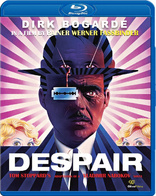
Movie rating
7.2 | / 10 |
Blu-ray rating
| Users | 4.5 | |
| Reviewer | 4.0 | |
| Overall | 4.2 |
Overview
Despair (1978)
Germany in the early 1930s. Against the backdrop of the Nazis' rise, Hermann Hermann, a Russian émigré and chocolate magnate, goes slowly mad. It begins with his seating himself in a chair to observe himself making love to his wife, Lydia, a zaftig empty-headed siren who is also sleeping with her cousin. Hermann is soon given to intemperate outbursts at his workers, other businessmen, and strangers. Then, he meets Felix, an itinerant laborer, whom he delusionally believes looks exactly like himself. Armed with a new life insurance policy, he hatches an elaborate plot in the belief it will free him of all his worries.
Starring: Dirk Bogarde, Andréa Ferréol, Klaus Löwitsch, Gottfried John, Isolde BarthDirector: Rainer Werner Fassbinder
| Drama | Uncertain |
| Fantasy | Uncertain |
Specifications
Video
Video codec: MPEG-4 AVC
Video resolution: 1080p
Aspect ratio: 1.66:1
Original aspect ratio: 1.66:1
Audio
English: DTS-HD Master Audio 2.0
Subtitles
None
Discs
50GB Blu-ray Disc
Single disc (1 BD)
Playback
Region free
Review
Rating summary
| Movie | 4.0 | |
| Video | 4.5 | |
| Audio | 4.0 | |
| Extras | 4.0 | |
| Overall | 4.0 |
Despair Blu-ray Movie Review
Mirror, mirror, on the wall, who's the maddest of them all?
Reviewed by Jeffrey Kauffman November 24, 2011The novels of Vladimir Nabokov have had a rocky road in various adaptations through the years. Nabokov’s best known
novel, Lolita, has made it to the screen twice, both times to less than glowing reviews, despite the first version
being helmed by the iconic Stanley Kubrick and the screenplay purportedly having been done by Nabokov himself.
(Nabokov had in fact written a screenplay, but virtually none of it was used for the Kubrick film. Name
recognition being what it was, Nabokov secured the 1962 version’s only Academy Award nomination for Adapted
Screenplay. He lost.) The 1997 version of Lolita was arguably much more faithful to Nabokov’s original source
novel, times having changed to the point where the quasi-pedophilia could be more vividly portrayed than it was (or
wasn’t as the case may be) in 1962, but perhaps for that very reason, the 1997 film tanked and people seemed unduly
creeped out by the film’s visceral sexuality. Lovers of Broadway flops know that Lolita was musicalized in the
early 1970s by none other than John Barry and Alan Jay Lerner, but that property (titled Lolita, My Love) also
failed to find an audience and actually closed out of town before it made it to Broadway, despite the fact that many
consider the score quite excellent and bootleg recordings of it have been a major collector’s item for years.
While Lolita in any of its many iterations is still probably the title most associated with Nabokov, the fact is there
have been several international adaptations of various Nabokov properties through the years, including everything from
the 1969 Tony Richardson film Laughter in the Dark, a film more than a bit reminiscent of Lolita itself, to
the 2000 John Turturro-Emily Watson starrer The Luzhin Defence, a kind of odd Bobby Fischer finds true love
(at least for a moment) melodrama centered around the world of a chess prodigy (Nabokov himself was an
amateur chess master). Virtually none of the many adaptations of Nabokov’s works have been very well received, and
that raises the perhaps salient question of whether or not Nabokov’s works can be translated to the medium of
film (or in fact any other medium). Perhaps no other contemporary author is so inherently aware of the playfulness of
language than was Nabokov, and similarly perhaps no other author exploited the dialectic between an omniscient
narrator and interior monologue as brilliantly as did the Russian émigré. (The only other author who springs
immediately to my mind as being in somewhat the same league is Anthony Burgess, who interestingly—and probably
not so coincidentally—found his own A Clockwork Orange adapted to film by Kubrick).
Nabokov’s dry yet
withering satire is also hard to port over to the traditionally dialogue bound style of most films, and that leaves many
filmmakers with an impossible conundrum: the works of Nabokov are in a way perfectly filmic in terms of character and
story, and yet they’re also in a way essentially unfilmable, at least with regard to their original approach. Many
Nabokov fans and film lovers feel that the closest any filmmaker has come to capturing the essential spirit of Nabokov is
Rainer Werner Fassbinder, whose 1978 opus Despair, like so many other films based on Nabokov, was greeted
with largely withering critical and audience reaction upon its original release. The intervening years have been kinder to
Despair than they have been for many other Nabokov inspired films, and Despair is often cited as an
early and underappreciated masterpiece of Fassbinder’s, perhaps at least equal to if not eclipsing his better known
The Marriage of Maria Braun, Berlin Alexanderplatz and Veronika Voss.
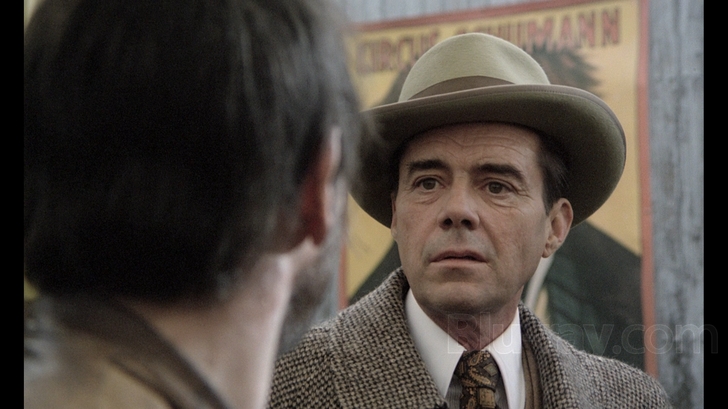
Nabokov’s fascination with the contradiction between surface perception and what’s actually going on within his characters is something many filmmakers have struggled with, but Despair allows for a central conceit that peels back the veneer of its focal character, allowing a glimpse into the roiling emotional content underneath. Hermann Hermann (Dirk Bogarde) is a chocolate magnate in early 1930s Berlin who is slowly but surely going quite mad, becoming more and more dissociative to the point where he regularly “sees” himself as an objective figure. Hermann Hermann as befits his mirrored named (something shared by Lolita’s Humbert Humbert, again certainly no mere coincidence), is fascinated by doubles, by doppelgangers, and that fascination ultimately extends not just to his own perception of himself as an “outside” entity, but to a homeless man (played by Klaus Löwitsch) whom Hermann decides is an exact double of his, despite the fact that the poor hapless soul looks nothing like the chocolatier. Hermann devises a plot involving a life insurance policy he feels will rid him of the monotony of his day to day life, including his marriage to a zaftig but largely brain dead woman named Lydia (Andréa Ferréol, baring it all—and then some—on screen).
The seediness and impending depravity of the Nazi regime plays in counterpoint to Hermann’s slowly devolving mental state, and in a way Hermann stands as a symbol for the degradation of the German soul (despite the character's quasi-denial of his Aryan heritage and seeming disdain for his fellow countrymen), caught between the megalomaniacal claims of “racial superiority” fostered by Hitler and his cronies and the sad bourgeoisie squalor of everyday existence. But Despair doesn’t revel in the fetid atmosphere as much as it gently satirizes it (a much different approach than, say, Bob Fosse’s reinvention of Cabaret, dealing with more or less the same timeframe). Part of this odd, even funny, approach can certainly be attributed to screenwriter Tom Stoppard, then in the early days of what would soon become an iconic career, but even then a master of language and characterization. Stoppard’s wordplay and fine ear for dialogue is perhaps the keenest approximation of Nabokov’s own playful approach in his novels and short stories, a playfulness that only partially masks and makes accessible the underlying dramatic truths of the characters.
Fassbinder and legendary cinematographer Michael Ballhaus (frequent collaborator with Martin Scorsese) offer a bracing and brilliant interpretation of the fractious state of Hermann’s mind. The camera swoops and swerves and almost seems to bump into both glass walls and mirrors, obviously potent visual metaphors for the twin (a propos) ideas of doubles and merging worlds. Bogarde, who is perhaps one of the most strangely underappreciated actors of his era, is remarkable in this role which requires him to be both dapper and destitute. It’s especially interesting to contrast his work in Despair with his turn in the extremely controversial The Night Porter, another film which seeks to exploit the perverse proclivities of the Nazi era, albeit in a more salacious and perhaps unsatisfactory way than Despair does. Bogarde is strangely both reserved and effete as well as hyperbolic and manic in Despair, and that peculiar combination helps to elucidate the fragile state of affairs not just in Hermann’s own psyche, but in a way, the German national soul as well.
Stoppard and Fassbinder up the mirror analogy to its most potent filmic possibility in the final scene of the movie, when Hermann’s madness is in full flower and he seems to be a male analog to Gloria Swanson’s Norma Desmond in Sunset Boulevard. He may not exactly be ready for his close-up, but the character seems to be arguing for the fact that audiences are in fact seeing their own close-up as they enter the world of film. To paraphrase the crazed heroine of Billy Wilder’s iconic savagery of Hollywood, an incredibly intimate film like Despair may not be epic, but it’s a film that definitely never gets “small.”
Despair Blu-ray Movie, Video Quality 
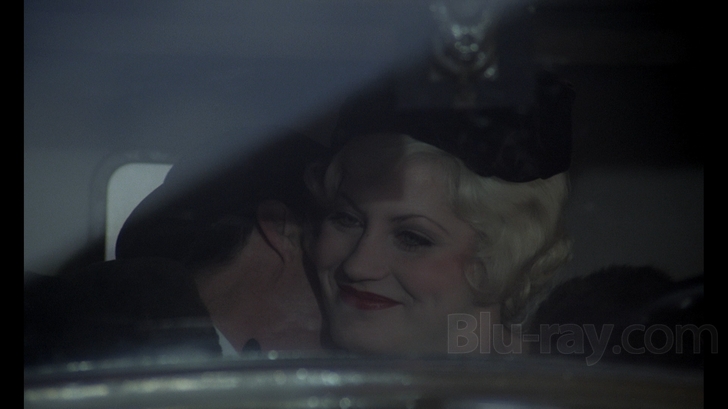
Despair is presented on Blu-ray courtesy of Olive Films with an AVC encoded 1080p transfer in 1.66:1 that is touted as an all new high definition restoration by Bavaria Media in cooperation with Cinepostproduction. Results here are largely extremely laudable, with a fine cinematic appearance and very good to excellent sharpness and clarity. The one issue some may have is with regard to the color, which seems just a tad pallid and indeed skewed somewhat toward the green side of things. I can't definitively state whether this is a telecine issue of color timing or is endemic to Fassbinder's original vision, but the purples, so important to the film's palette, have just a slight undercurrent of chartreuse, and even the Nazi uniforms are just slightly on the green side. This is not to overstate or denigrate the transfer, for in total it's really fantastic looking, with excellent fine detail and good shadow detail. A lot of the film is intentionally dark and dimly lit and while some background objects disappear into the murk, there's not any significant crush. There may have been some very moderate DNR applied here, but it is not to "waxy smooth" proportions and will probably not bother or alarm most viewers.
Despair Blu-ray Movie, Audio Quality 

Despair is offered with a lossless DTS-HD Master Audio 2.0 mix that really doesn't provide much opportunity for either depth or nuance, but which reproduces dialogue and Peer Raben's evocative score extremely well. This is really a rather quiet film for the most part, and so dynamic range is negligible, but fidelity is excellent throughout and the soundtrack has no damage whatsoever to report. There's nothing showy about this mix but it's serviceable and gets the job done very well.
Despair Blu-ray Movie, Special Features and Extras 
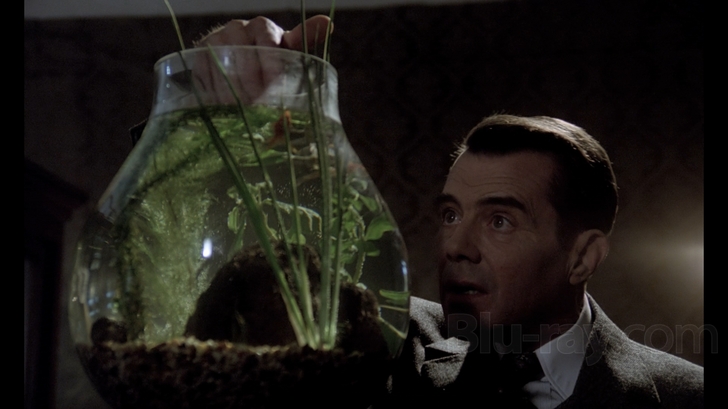
The Cinema and its Double: Rainer Werner Fassbinder's Despair Revisited (HD; 1:12:53). This absolutely top-notch documentary by Robert Fischer is a fascinating look back at not just the film in question, but Fassbinder's meteoric career which ended all too soon with his untimely death. Archival footage of Fassbinder is utilized (including several fascinating snippets culled from interviews he did at the disastrous Cannes premiere of Despair), as well as many others involved in the film and its release. Even if you're not a particular fan of Despair, or even in fact of Fassbinder, this is stellar documentary filmmaking and is an intriguing look at one of the most enigmatic masters of the New German Cinema.
Despair Blu-ray Movie, Overall Score and Recommendation 
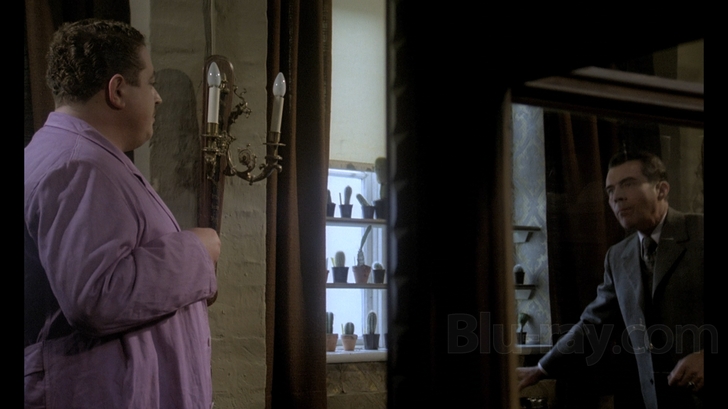
Despair can be an off-putting film, even to some its most rabid fans. Stoppard frequently likes to hold his audience at arm's length, letting them revel in the absurdities and inconsistencies his characters convey, and that tendency is only increased by the dissociative quality of Hermann himself, where he becomes simultaneously subject and object. Within this convoluted structure, however, lies a deeply involving film and one that works with almost subliminal power to deliver some shockingly visceral emotional content. Fans of Fassbinder will be out of their minds (no pun intended) with this release, but any lover of international cinema really should check this film out, as it's a one of a kind experience on several levels. Highly recommended.
Similar titles
Similar titles you might also like

Donnybrook
2018

Cemetery of Splendor
2015

La Chienne
The Bitch
1931

Barbara
2012

An Elephant Sitting Still
大象席地而坐 / Da xiang xi di er zuo
2018

The Phantom Carriage
Körkarlen
1921

Querelle
1982

Zelig
1983

Transit
2018

Berlin Alexanderplatz
1980

Stroszek
1977

Monos
2019

Just a Gigolo
1978

The Night Porter
Il portiere di notte
1974

The Story of Temple Drake
1933

Sex Madness
1938

The Watermelon Woman
1996

Night After Night
1932

Container
2006

Little Buddha 4K
1993